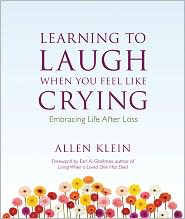In this most helpful book, Allen Klein shows how to
transform your attitude toward loss, whether it be a loved one’s death, the
loss of a job, or the trials associated with aging, in order to return to
living life more fully again.
As a pioneer in the field of loss and crisis intervention, I
have seen many ways that people cope with grief and loss. Sometimes laughing is
a healing medicine. The eminent psychiatrist, Viktor Frankl, a concentration
camp survivor, provides perhaps a most powerful example. Everyday he found
something funny to laugh about. He credited his survival, in part, to humor. It
gave him hope to look forward to each day. It afforded him the power to rise
above an almost powerless situation. I say, “almost,” because Frankl attributed
his survival to attitude, the real power one has over any situation.
Klein is no stranger to the value of therapeutic humor as an
attitude-changing tool. From his experience as a former home health aide and
hospice volunteer, as well as from the personal and career losses in his life,
he has amassed a wealth of compassionate wisdom. This knowledge is presented
here in a very easy-to-digest, helpful, and reader-friendly format.
Like Elizabeth Kubler Ross’s five stages of dying, Klein has
created what he calls “the five stages of living” after loss. They are Losing,
Learning, Letting Go, Living, and Laughing.
In one of his previous books, The Courage to Laugh: Humor, Hope, and Healing in the Face of Death and
Dying, Klein imparted encouraging stories of how those who were facing
life-threatening challenges, from such crises as cancer, AIDS, lingering loss,
or sudden loss, had used humor as a meaningful coping tool. In the book, Learning to Laugh When You Feel Like Crying,
Klein goes a step further. With inspirational quotations, lessons from diverse
cultures, and heartwarming advice, he provides numerous suggestions for finding
humor during those not-so-funny times.
While death, dying, and loss are no laughing matter, those
who find a bit of humor in the grieving process know that they will survive.
When laughing, you have a moment’s respite in what is often an overwhelming
circumstance. It is a wonderful way to communicate at a time when communication
is often at an impasse. In addition, you gain a different perspective at a
difficult time and rise above life’s adversities.
And, perhaps the most important gain is that humor and
laughter, as Frankl discovered fosters hope. I have always been intrigued with
the power that hope provides during a crisis. Without hope all is lost.
There are many books about coping with grief and loss. I
have written a few of them myself. But Learning
to Laugh When You Feel Like Crying is unique because of its focus on
enduring losses, learning from them, and beginning to live and laugh again.
I hope that you will read this book. For it will not only
provide you with hope but also with a passion for life.
Rabbi Earl A. Grollman, DHL, DD

No comments:
Post a Comment